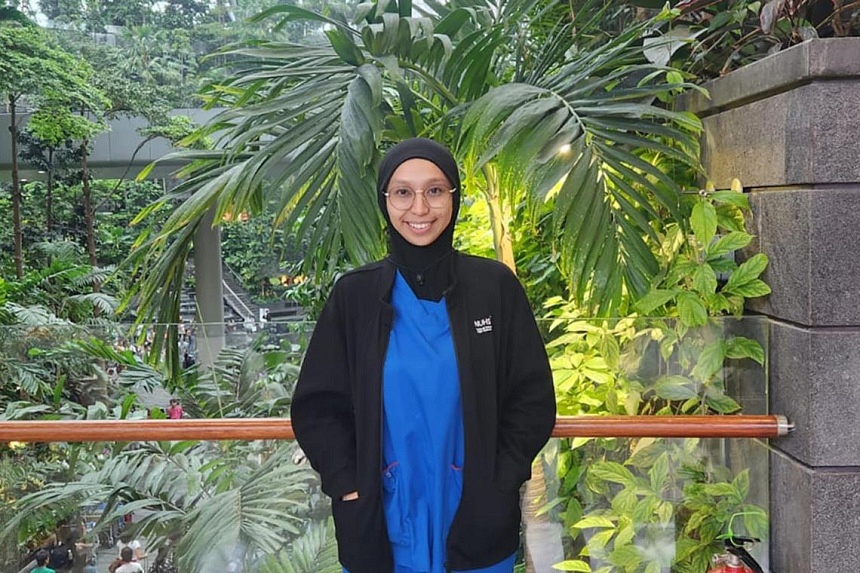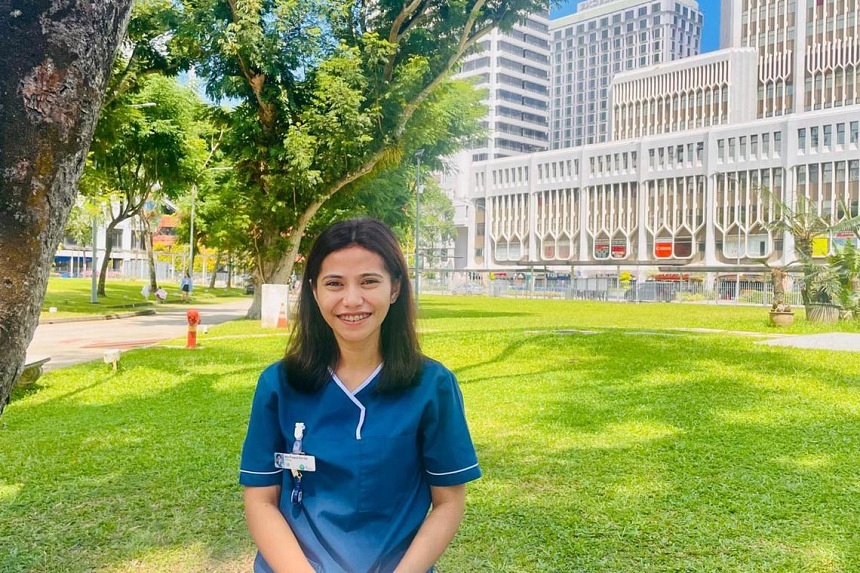More Indonesian nurses coming to Singapore for better pay, skills upgrade
Ms Nissa Fadillah Somantri (left) and Ms Ayu Puspita Sari Itta are among the Indonesian nurses who are working in Singapore public hospitals. PHOTOS: COURTESY OF NISSA FADILLAH SOMANTRI, AYU PUSPITA SARI ITTA
Linda Yulisman
Indonesia Correspondent
Aug 22, 2024
JAKARTA - More than a year after Indonesia first started sending nurses through recruitment agencies to Singapore, there are plans to deploy more caregivers to meet the island’s healthcare needs.
Healthcare players also report growing interest among Indonesian healthcare workers to seek employment abroad, driven by higher salaries and opportunities for career and personal development.
From June 2023 to June 2024, 66 Indonesian nurses have been working in Singapore public hospitals such as Tan Tock Seng Hospital and Changi General Hospital, said Mr Rendra Setiawan, director of placement and protection of Indonesian migrant workers at the Indonesia Manpower Ministry.
Most of them arrived in Singapore as healthcare assistants and had to pass the Singapore Nursing Board exam to become enrolled and registered nurses in Singapore.
“There have been two recruitment drives in Indonesia under a private-to-private (P to P) scheme through agencies (since 2023), and a process is under way to bring those selected to Singapore,” Mr Rendra told The Straits Times.
He added that the programme was introduced in 2023 to allow Indonesian healthcare workers to work in Singapore hospitals, with recruitment agencies as the middleman. “From the government side, we support the placement of Indonesian nurses overseas, including in Singapore,” said Mr Rendra.
Singapore
will need 24,000 additional nurses and healthcare staff by 2030, he said, citing figures from Singapore’s Ministry of Health, adding that this demand brings opportunities for Indonesian nurses.
Until 2023, there was no formal placement programme for Indonesian nurses to be sent to Singapore. This was perhaps due to hurdles that included the lack of English language skills as well as the need for candidates to pass Singapore’s nursing board exams, said Ms Judy Low Lai Kwan, regional head of Singapore and Indonesia at Talent Angels, a Singapore-based international recruitment agency that has brought in Indonesian nurses.
But a small number of Indonesian nurses had previously made their own arrangements to seek employment at Singapore hospitals, said Ms Low, adding that generally, not many Indonesian nurses were aware of such opportunities.
She said that with more publicity and recruitment drives in Indonesia, more of its healthcare workers have now come to Singapore in larger groups. Talent Angels is currently the only agency recruiting Indonesian nurses, she added.
Among the new recruits is Ms Nissa Fadillah Somantri, who joined Jurong Community Hospital as an enrolled nurse in February 2024, after getting her licence in March 2023. She had previously worked for 1½ years in a public hospital in Bandung, West Java.
She said one of the major challenges was adjusting to a new working culture, which she described as demanding “speed and accuracy”.
“We must do everything in line with the standard operating procedure. Otherwise, we’ll get a warning. It’s stricter in Singapore,” the 34-year-old mother of one told ST. “It’s quite a big deal if we make mistakes.”
Ms Nissa Fadillah Somantri joined Jurong Community Hospital as an enrolled nurse in February. PHOTO: COURTESY OF NISSA FADILLAH SOMANTRI
But rising to the challenge was worth it, said Ms Nissa, who now earns seven times her salary in Indonesia. This was one of her primary reasons for pursuing work abroad, she added.
Indonesia has different minimum salaries for various jobs, including nursing, across its provinces and regencies. In Jakarta, which has the highest minimum salaries, the starting pay for nurses is 5.07 million rupiah (S$427) a month. Ms Nissa, for instance, was paid 3.5 million rupiah when she started in 2017.
Another Indonesian nurse, Ms Ayu Puspita Sari Itta, started working as a registered nurse at Khoo Teck Puat Hospital in April.
In her first three months, she grappled with speaking English at work as well as keeping up with using advanced medical equipment she was not familiar with.
“I saw these challenges in a positive light... Now I understand English better,” said Ms Ayu, adding that she improved her language skills by watching English language movies and programmes in her free time.
“I’ve also learnt how to use sophisticated medical equipment. It was very tough at the beginning, but it feels less hard now,” said the 28-year-old, noting that she had learnt a lot from her colleagues.
Now that she is earning more, Ms Ayu is saving up in the hope of pursuing a Master’s degree in nursing in the future.
Ms Ayu Puspita Sari Itta started working as a registered nurse at Khoo Teck Puat Hospital in April. PHOTO: COURTESY OF AYU PUSPITA SARI ITTA
Indonesia, with a population of about 280 million, is seeing a growing number of people taking up nursing. In 2021, there were 511,191 nurses, up 16.7 per cent from 2020. But a significant proportion – nearly 35 per cent (176,470) were surplus to the country’s needs.
Though Indonesia’s nursing schools train about 60,000 new nurses each year, they are often not well-distributed across the archipelago, especially in the more remote areas.
Those who cannot find jobs as nurses become caregivers or work in unrelated industries.
Singapore is not the only country to welcome Indonesian healthcare workers, who have been heading overseas since the 1990s to destinations such as the Netherlands and Kuwait.
Excluding those in Singapore, 1,468 Indonesian nurses worked abroad from January to August 2024, with 924, or 63 per cent, going to Taiwan. The rest were in Japan (135), Saudi Arabia (407) and Germany (two), according to figures from its Manpower Ministry.
In 2023, 2,139 Indonesian nurses, up 25 per cent from 2022, earned a living overseas.
Indonesia has sent nurses to various countries, such as Japan, the US, the Netherlands, Germany and Saudi Arabia, under formal cooperation programmes, while a number of nurses have worked independently in countries like the US and the Netherlands, according to the Population Research Centre at the National Research and Innovation Agency.
Mr David Law, the chief executive of Talent Angels, said that the arrival of nurses from Indonesia adds to the list of countries from which Singapore typically hires foreign healthcare workers, such as Malaysia, the Philippines, Myanmar, Sri Lanka and India.
“Singapore has a shortage of nurses, especially after Covid-19, so bringing in Indonesian nurses is an alternative that can help ease the nursing labour crunch,” he said. “There will definitely be plans to bring in more Indonesian nurses to Singapore in the near future.”
Mr Rendra said that apart from higher salaries and opportunities to gain more skills, Indonesian workers are also attracted by the variety of work available at healthcare facilities abroad, such as smaller clinics or nursing homes.
“Working abroad also gives them a chance to interact with their peers from other countries, and this enhances their capability to work in a multinational team. And on top of that, they have an opportunity to move to other countries that offer better welfare and benefits,” he told ST.
“Those working abroad certainly gain more knowledge and experience, and they will bring this home when they return to work here, even transferring their knowledge to other nurses.”
A local nurse group, however, said that instead of encouraging Indonesian healthcare workers to seek opportunities abroad, more must be done to improve the job opportunities and welfare of those working at home first.
Indonesian National Nurses Association chairman Harif Fadhillah said: “We are happy with efforts to facilitate nurses to work abroad. But the government also needs to support (nurses working at home) through policies and regulations to improve their welfare and create more (domestic) jobs.”
Still, for nurses like Ms Nissa and Ms Ayu, the chance to work in healthcare facilities overseas has helped them become more hopeful in their careers.
Ms Nissa sees her current job as a “stepping stone” for future opportunities. “Chances of working in the US or Europe are wide open when we’ve worked in Singapore. They will recognise our skills,” she said.





